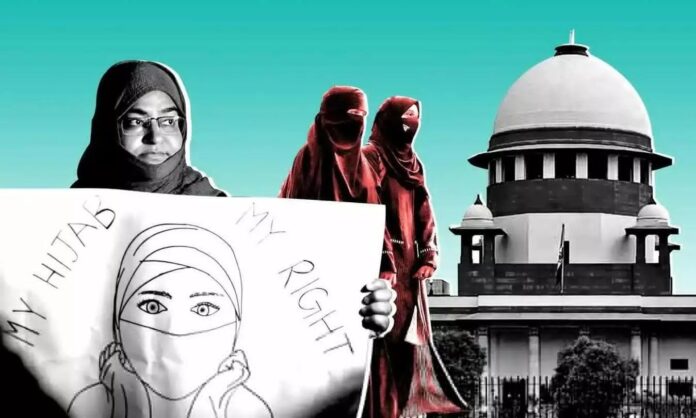While expressing surprise at the College’s policy, the Supreme Court questioned the necessity of such restrictions, pointing out that other religious symbols, such as tilaks and bindis, also reveal religious identities.
India Tomorrow
NEW DELHI: The Supreme Court has issued an interim order staying the ban imposed by NG Acharya & DK Marathe College in Mumbai that prohibited Muslim students from wearing hijabs.
The court urged educational institutions to avoid imposing restrictive dress codes on students, questioning the rationale behind such rules.
The stay was given following a legal challenge by students who contested the college’s ban on wearing hijabs, caps, and badges on campus.
During the hearing, the bench, comprising Justices Sanjiv Khanna and Sanjay Kumar, expressed surprise at the college’s policy. They questioned the necessity of such restrictions, pointing out that other religious symbols, such as tilaks and bindis, also reveal religious identities.
Justice Khanna remarked, “How are you empowering women by telling them what to wear?”
He criticized the college’s policy, highlighting that students’ names and other symbols could also indicate their religion. Justice Kumar added, “Will you say that somebody wearing a tilak will not be allowed?” and questioned whether students would eventually be identified by numbers instead of names.
While the court stayed the college’s circular, it upheld the prohibition on face-covering veils like niqabs and burqas, citing their potential impact on classroom interaction.
The court also issued a notice for the petition to be returned in the week beginning November 18, allowing the college to seek modifications if necessary and urging that the stay not be misused.
The Supreme Court’s intervention reflects the ongoing tension between institutional autonomy and individual rights. The college, a private institution, had implemented a controversial dress code to maintain a uniform appearance among students. However, the court’s ruling emphasizes the need for policies that respect students’ religious practices while fostering an inclusive educational environment.
The controversy began on May 1, when NG Acharya & DK Marathe College issued a notice through its official WhatsApp group, outlining a dress code that banned the wearing of hijabs, niqabs, burqas, caps, badges, and stoles on campus. The affected students initially sought to have these restrictions lifted by approaching the college administration, arguing that the ban infringed on their rights to personal choice, dignity, and privacy within the educational setting.
When the college management dismissed their concerns, the students sought the intervention of higher authorities, including the chancellor and vice-chancellor of Mumbai University and the University Grants Commission. After receiving no response, they filed a petition with the Bombay High Court. In court, the students’ advocate argued that the hijab is an essential aspect of Islamic practice, challenging the college’s ban as arbitrary and discriminatory. Meanwhile, the college management defended the dress code as a neutral measure intended to promote uniformity and discipline among all students, regardless of religion or caste.





